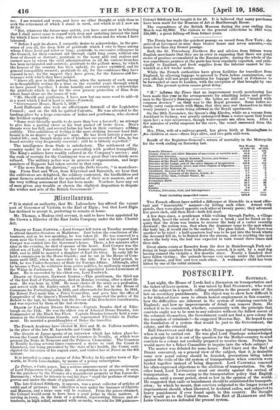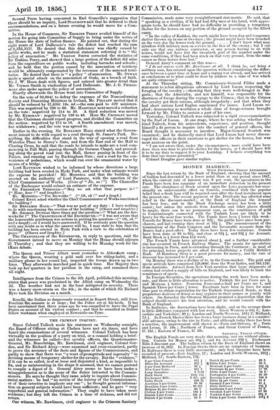POSTSCRIPT.
SATURDAY.
Last night, the House of Lords had a discussion on transportation and. the ticket-of-leave system. It was raised by Earl STANHOPE ; who went over the subject in a speech calling attention to the present state of the law on secondary punishments. His object was to show how difficult it is for ticket-of-leave men to obtain holiest employment in this country; how the difficulties are inherent in the system of retaining convicts in England; and how no improvements of detail can remove them. He wished it to be considered, whether, consistently with the principle that convicts ought not to be sent to any colonies without the fullest assent of the colonists themselves the Government could not find a new colony for the reception of criminals ?—he suggested Moreton Bay. He hoped to see the foundation of a system that would be just to the Government, the colony, and the criminal. Earl GRANVILLE said that the whole House approved of transportation when it can be carried out. He was glad Lord Stanhope acknowledged the principle that it is out of the question for the Mother-country to send convicts to a colony not cordially prepared to receive them. Perhaps he would move for a Select Committee to inquire into the whole subject ? The matter was debated for some hours. Earl GREY and the Earl of DERBY concurred, on a general view of the subject, that it 'Lis desirable some new penal colony should be founded, precautions being taken against the evils of the old system of transportation when convicts were herded together instead of being dispersed. Lord CAMPBELL renewed his often-expressed objections to the abolition of transportation. On the other hand, Lord LyTrEurox stood out stoutly against the revival of transportation. It was owing to the transportation policy that English colonies, until a recent period, stood so low in the opinion of the world. He suggested that exile or banishment should be substituted for transport- ation; by which he meant, that convicts subjected to the longer terms of imprisonment should, when liberated, be declared exiles and subjected to heavy punishment if ever found again in this country. He thought they would go to the United States. The Earl of HAB.ROIVBT and the Loan CHA16CELLOR defended the present system. Several Peers having concurred in Earl Grnnville's suggestion that there should be an inquiry, Lord STANHOPE said that he deferred to their recommendations, and on a future evening he would move for a Com- mittee.
In the House of Commons, Sir Easemni Prim availed himself of the motion for going into Committee of Supply to bring under the notice of the House the state of Indian finance. He pointed out, that during the eight years of Lord Dalhousie's rude the deficit had reached the sum of 6,335,317/. He denied that this deficiency was chiefly caused by public works, and he made a statistical statement referring it to "the policy of annexation." Mr. VERNON SMITH corrected the statistics of Sir Erskine Perry, and showed that a large portion of the deficit did arise from the expenditure on public works, including barracks and schools ; and he held that the portion caused by the annexation of territory would be ultimately compensated by the revenues of the annexed terri- tories. He denied that there is " a policy" of annexation. Mr. OTWAY made a special attack on the annexation of Oude, as a breach of faith. Sir J. W. HOGG dealt with figures, and entered into greater detail than Mr. Vernon Smith in vindication of Lord Dalhousie. Mr. J. G. Pirma- MORE also spoke against the policy of annexation. Shortly afterwards the House went into Committee of Supply.
On the vote of 39,0041. to defray the expenses of the Nonconforming Society and Dissenting Ministers in Ireland, Mr. Pemairr moired that it should be reduced by 37,6391. 18s. 4d.—the sum paid to 529 ministers. This was negatived by 230 to 60. Mr. HADFIELD next moved a reduction on the vote : negatived by 214 to 39. A third reduction was moved by Mr. KERSHAW : negatived by 198 to 40. Here Mr. CROSSLEY moved that the Chairman should report progress' and divided the Committee on the motion : negatived by 211 to 16. A fourth amendment was moved, but withdrawn ; and the vote was agreed to.
Earlier in the evening, Sir BENJAMIN HALL stated what the Govern- ment intend to do with regard to a road through St. James's Park. De- scribing the difficulties that stand in the way of opening a road from Waterloo Place to Storey's Gate, and from the East end of the Mall to Charing Cross, he said that the roads he intends to make are a road com- mencing in Pall Mall, passing through the German Chapel, and proceed- ing along the paved road into the Mall, thence passing in front of the Palace, and running out by Buckingham Gate ; and a road for the con- venience of pedestrians, which would run over the ornamental water by means of a bridge. Lord RAYNHAM wished to be informed by whose directions a large building had been erected in Hyde Park, and under what estimate would the expense be provided? Mr. MONSELL said that the building was erected on the authority of Lord Panmure, with the sanction of the Chief Commissioner of Works. (Cries of "N, no !") The Chancellor of the Exchequer would submit an estimate of the expense. Sir FREDERICK THPRIGER—" May we ask what that purpose is ? " (" Hear, hear !" and laughter.) Mr. MoNsmx--" For fireworks." (" Oh, oh !" and a laugh.) Colonel /Noe asked whether the Chief Commissioner of Works sanctioned the building ?
- Sir BENJAMIN Hara,--" That was no part of my duty : I have nothing to do with sanctioning the erection of the building." (Cheers and laughter.) . Mr. GEORGE DIINDAS three times put the question—" What are the fire- works for ?" The CHANCELLOR of the EXCHEQUER—" I was not aware that the honourable gentleman was serious in putting his question—(" Oh, oh 1" and a laugh)—or I would have answered it. If he seriously puts the question with any doubt as to what the answer will be, I may state to him that the building has been erected in Hyde Park with a view to the celebration of peace.' (Cheers and laughter.)
The CHANCELLOR of the EXCHEQUER, in reply to questions, said the Government intend to move on Monday that the House should adjourn ill Thursday ; and that they are willing to fix Monday week for the tKars debate.



























 Previous page
Previous page